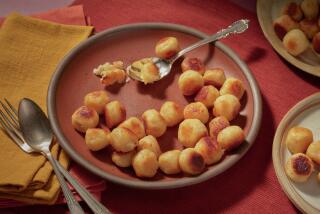Russian soul food
- Share via
MY HUSBAND planted potatoes in my flower garden. It wasn’t a surprise -- I was his unwilling partner in crime -- but it still shocks me every time I see the long mound of dirt inside which, he insists, potatoes will grow. Most Americans happily purchase their potatoes at the supermarket. They aren’t expensive. And they don’t make a statement in the garden. My husband, however, is Russian. And in Russia, planting one’s own potatoes is a source of pride. City dwellers flee their urban environs in May to celebrate the end of a long winter -- with potatoes on their minds. Most of these weekend warriors plant their spuds with loving affection, waxing philosophical on the proper technique. Personally, I’ve always preferred waiting for the perennial gooseberries to emerge on their own.
Which is why it is always helpful to have a Russian about to insist on the basics. We have a commuter marriage, and although he is more of a visitor here than an emigre, my husband believes that home is where the potatoes are. He owes it to his family to ensure our survival through next winter, even if he can’t be here to shovel the snow himself. When the ground softens and warms in my Maryland garden, his biological clock tells him it’s time to get busy.
But the problems emerge as soon as the first shovelful of dirt is excavated. On his knees, he peers critically at the seamy underside of the earth and pronounces in shock: “This is the wrong kind of dirt.” What? How could there be anything wrong with the dirt that some scoops of packaged potting soil can’t fix? And is it even theoretically possible that America has the wrong kind of dirt, at least around my house?
We’ll need to fix it, he says. OK, I proudly wheel out a bag of clean dirt and reach for the scissors. No. First we need some dried leaves. Where are the leaves from the fall? he asks, looking around the yard. I avoid meeting his eyes and say innocently, “What leaves?” Of course they are long gone, carted off last fall to my great relief. “You gave them away?!” I look down. “And you probably weren’t even paid for them!” Hmm. Some cultural misunderstandings may be too wide to forge.
Suddenly I remember that the house down the street has been empty since last year and must surely hold deep reserves of precious leaves. I enlist our son, who may just have the required mix of Russian spirituality and American practicality, and we head out with a large barrel to do penance. We scoop up great armfuls of spidery leaves and in minutes return triumphant with our offering.
As soon as we arrive, my husband puts down the shovel with which he has been gamely turning over the wrong dirt and turns expectantly to our vegetal equivalent of a dead mouse. “No, no,” he says in that patient way you use with a very small child who will never understand why he cannot eat your shoes. “These are not the right kind of leaves.” We look down in amazement. America has the wrong leaves too? Oak leaves are the worst for turning into potatoes, he explains. They’ll make the potatoes hard and woody. As we drag ourselves and our basket dejectedly back down the driveway, we hear him calling out, “Maple! They’re the sweetest!”
We do find maple leaves -- fortunately a decorative Japanese maple qualifies -- and return to watch them mixed lovingly into the soil. Then potatoes are called for. Such is my ambivalent relationship with this food for the mysterious Russian soul that I happen to have a relic in my cupboard: a bag of sprouted old potatoes pleading to be put out of their misery. My husband’s skeptical look as I return with the bag is soon replaced with a cry of delight. Night has fallen, and the potatoes are planted by flashlight.
Every day I go out to water my flowers and contemplate the sofa-sized mound from which, some claim, potatoes will grow. My husband went back to Russia shortly after making this agricultural contribution to our family, and I worry that my soul may lack, among other things, the potato-nurturing elements expected of a Russian wife. And yet I’m sure that what Russians and Americans have in common outweighs what they do not.
As small tribute to the concessions we all make in relationships, I diligently water the potatoes, admiring despite myself their strong, dark green leaves and all the while murmuring a silent prayer that they’ll turn out to be the right kind.






